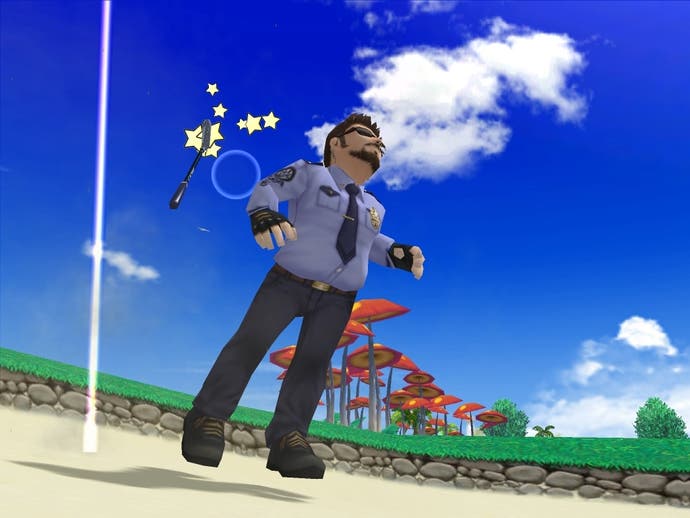PangYa
The free MMO golf game also known as Albatross18.
Playing with experienced players, as in many games of this sort, is the best way to learn the game's tricks. You'll take a beating, probably, but will come away far better informed about how to squeeze the most possible Pang points out of a course with elaborate, risky shots. PangYa's courses are very well designed to reward risk-taking, and along with the goading of other players, the allure of extra Pang points drives you towards difficult shots rather than conservative play. Consequently, the outlandishness of the golf being played matches the eccentric presentation, as four players all watch each other attempt the same ridiculous trick shot, and commiserate upon failing. Courses are designed from the ground up for multiplayer, with ample room for showing off and for communal smirking as an over-ambitious ball goes plopping straight into a strategically-placed pond. Virtual golf, it turns out, is an awful lot more fun played in front of other people.
The in-game shop is refreshed constantly with new, snazzy, often seasonal items of clothing, and as this is where PangYa makes its money, a lot of effort goes into tempting you to buy them. PangYa is about 80 per cent golf game and 20 per cent boutique; much of the appeal comes from customising and dressing up your own character, and admiring the eccentric attire of others' creations during the rounds or in the pre-game chatrooms. Anything that that grants truly impressive benefits must be bought with Pang points, which reserves the elite items for addicts and dedicated players.
The great thing about the currency system is that it operates on a mixture of in-game Pang points, earned by playing the courses, and Astros, which are bought with real money. Some items can only be bought with one or the other, but most have both options. The upshot of it is that you can't simply buy golfing prowess, and you're never forced to spend any money - you can develop a perfectly good character simply through playing the courses and earning the experience and Pang points to improve. Spending real money only grants aesthetic benefits - a character with five quid's worth of schoolboy/girl uniform, a pirate hat and a depressed-looking flying rabbit for a mascot just looks better than the blue t-shirt and white shorts you begin with, and it's a lot quicker than earning the in-game currency.

PangYa has a friendly and mildly eccentric community - as with real golf, it's one of the only games in which your competitors' successes make you almost as happy as your own. As you progress up the ranks, things can become slightly more serious (as serious as things can get in a Korean fantasy golf game in which you can hire a giant grinning bear to carry your clubs), but by then you'll have found friends, or convinced some real-life ones to download it and join your crazy-golf paradise. Because it's a familiar golf game at heart, you can jump in and out at will; it's equally suited to playing obsessively for a while and to occasional rounds with friends, which is great for on-and-off players. I've found that PangYa has easily replaced offline golf games in my affections.
PangYa is a great example of how MMO developers can invigorate an established genre, and an admirable indication of how a free-to-play model can work without unbalancing things with game-breaking benefits that are only available to paying players. Its appeal comes down to solid, simple gameplay mixed with an irresistible madness factor and, or course, sociability. Try it as your next lunchtime game; if you've ever enjoyed a golf game before, you're in definite danger of developing an addiction. My own goes back a year and half now, and shows no signs of abating.
